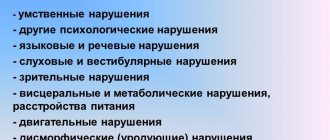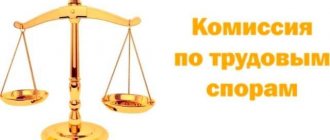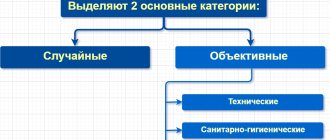The work of the commission body, which investigates the circumstances of an employee’s development of an occupational disease, is closely related to the activities of the commission members examining the causes of accidents at work sites. The differences between these two collegial structures lie in three parameters: · who heads the commission to investigate an occupational disease; · quantitative co. Similarities and differences in the organization of work of the commission for the investigation of industrial accidents and the commission for the investigation of occupational diseases
Who heads the commission to investigate occupational diseases?
From a normative point of view, the concept of occupational diseases and commissions to investigate them in the Russian Federation is primarily regulated by the principles of Decree of the Government of the Russian Federation No. 967 dated. Briefly, the operating procedure of such a commission is as follows:
- The employee undergoes a medical examination at any medical institution, both as part of a medical examination and at his own request.
- If a doctor conducting an examination or treating a patient detects a disease as a preliminary diagnosis, he is obliged to notify the state sanitary and epidemiological inspection center about this.
- In the case of an acute form of the disease, notification must be sent within 24 hours after diagnosis. In addition, the doctor or medical institution is required to send a notice to the employer within the same period.
- If a chronic occupational disease is detected, only supervisory authorities are notified within three days, and the employer is notified only by the occupational pathology center after a series of mandatory procedural steps.
- The employer, within ten days from the date of receipt of the notice, is obliged to ensure the creation and functioning of a commission to investigate an occupational disease.
The answer to the question of who heads the commission to investigate an occupational disease is contained in the standards of the above-mentioned government decree. The chairman in this situation is the head physician of the state institution of sanitary and epidemiological supervision. In addition to him, the commission must include representatives of the parties to labor relations, health care organizations, a person responsible for labor protection and a member of the trade union, if there is one at the enterprise.
We investigate and take into account cases of COVID-19 diseases
17.07.2020
The Department of Legal and Social Protection of the Trade Union apparatus has prepared information material for organizing a timely investigation of cases of the new coronavirus infection (COVID-19) and providing employees of medical organizations with state guarantees in accordance with Decree of the President of the Russian Federation dated May 6, 2020 No. 313.
Due to the fact that the trade union of healthcare workers of the Russian Federation receives questions related to the implementation of Decree of the President of the Russian Federation dated May 6, 2020 No. 313 “On the provision of additional insurance guarantees to certain categories of medical workers” and the organization of investigations into occupational diseases of the new coronavirus infection (COVID- 19) for employees of medical organizations, the department of legal and social protection of the Trade Union apparatus prepared information for use in work on the basis of regulatory legal acts and clarifications of government authorities.
Decree of the President of the Russian Federation dated May 6, 2020 No. 313 extends its effect to doctors, nursing and junior medical personnel of medical organizations, drivers of emergency medical vehicles, directly employed
with patients confirmed to have a new coronavirus infection (COVID-19) and patients suspected of having this infection (hereinafter referred to as medical workers).
Note:
According to the Trade Union, the Decree of the President of the Russian Federation does not contain a specific list of positions or specialties of medical workers, determining only that they must work directly with patients confirmed to have a new coronavirus infection (COVID-19), and patients suspected of this infection and when deciding on the investigation and provision of insurance payment, it is necessary to be guided by these signs.
Insurance payment must be made regardless of the guilt of the employee or employer established during the investigation. Clause 4 of the Decree of the President of the Russian Federation dated May 6, 2020 No. 313 establishes that a one-time insurance payment is made in the following cases:
a) the death of a medical worker as a result of infection with a new coronavirus infection (COVID-19) while performing his job duties - in the amount of 2,752,452 rubles to the relatives of the deceased in equal shares;
b) causing harm to the health of a medical worker in connection with the development of a disease (syndrome) acquired during the performance of work duties or a complication caused by laboratory-confirmed research methods
new coronavirus infection (COVID-19), included in the list approved by Decree of the Government of the Russian Federation dated May 15, 2020 No. 1272-r, and resulting in temporary disability, but not leading to disability - in the amount of 68,811 rubles;
c) in the event of a medical worker’s permanent loss of ability to work as a result of the development of complications after an illness caused by a new coronavirus infection (COVID-19), confirmed by laboratory research methods
if the disease arose during
the performance
of his
work duties
:
disabled person of group I – in the amount of 2,064,339 rubles;
disabled person of group II - in the amount of 1,376,226 rubles;
disabled person of group III - in the amount of 688,113 rubles.
At the same time, in accordance with clause 5 of the Decree of the President of the Russian Federation dated May 6, 2020 No. 313, a one-time insurance payment is made in excess of the stipulated
Federal Law of July 24, 1998 No. 125-FZ “On compulsory social insurance against industrial accidents and occupational diseases” payments.
Employees of a medical organization performing work on the basis of an employment contract who have a confirmed occupational disease (insured event) caused by a new coronavirus infection (COVID-19), in accordance with Federal Law No. 125-FZ of July 24, 1998, have the right to the following types of insurance coverage:
1) in case of death of the insured – 1,000,000 rubles
beneficiaries;
Note:
In the event of the death of the insured, the amount of monthly insurance payments to persons entitled to them is calculated based on the average monthly earnings of the insured, minus the shares attributable to himself and able-bodied persons who were his dependents, but not entitled to receive payments.
To determine the amount of payments to each person entitled to them, the total amount of these payments is divided by the number of such persons. The following have the right to receive survivor benefits:
- disabled persons who were dependent on him or who at the time of death had the right to receive maintenance from him;
- one of the parents, spouse or other family member, regardless of his ability to work, who does not work and is engaged in caring for the deceased’s dependent children, grandchildren, brothers and sisters who have not reached the age of 14 years, or who are older but in need health status in external care;
- the insured’s child born after his death;
- persons who were dependent on the insured and who became disabled within five years from the date of his death.
2) in case of permanent loss of professional ability to work (from February 1, 2021):
— a one-time insurance payment based on the maximum amount of 103,527.66 rubles + regional coefficient in accordance with the degree of loss of professional ability;
- monthly insurance payment based on the percentage of disability established by the Bureau of Medical and Social Expertise - up to 79,602.38 rubles
;
Note:
The right to receive insurance payments (monthly and one-time) accrues to the insured if the result of an insured event was a permanent loss of professional ability, as determined by the Bureau of Medical and Social Expertise.
The monthly insurance payment is intended to replace the loss of earnings caused by a decrease in the insured person’s ability to work as a result of an insured event.
The payment is assigned for the period of establishment of permanent loss of professional ability to work.
The amount of the monthly insurance payment is determined as a share of his average monthly earnings, calculated in accordance with the degree of loss of his professional ability to work.
The average monthly earnings of the insured are calculated by dividing the total amount of his earnings (taking into account premiums accrued in the billing period) for the 12 months that resulted in damage to the health of the work preceding the month in which he suffered an accident at work, was diagnosed with an occupational disease, or (optional) the insured) the loss (decrease) of his professional ability to work has been established by 12. At the request of the insured, upon the occurrence of an insured event due to an occupational disease, the average monthly earnings can be calculated for the last 12 months of work preceding the cessation of work that resulted in such disease.
The calculated and assigned monthly insurance payment is not subject to further recalculation, with the exception of cases of change in the degree of loss of professional ability, changes in the circle of persons entitled to receive insurance payments in the event of the death of the insured, as well as cases of indexation of the insurance payment.
If the commission conducting the investigation of the insured event found that the gross negligence of the insured contributed to the occurrence or increase of harm caused to his health, then the monthly insurance payment is reduced in proportion to the established amount of fault, but not more than 25%.
3) in case of temporary disability – temporary disability benefits (“sick leave pay”) are paid in the amount of 100 percent of the employee’s average earnings. The maximum amount of temporary disability benefits due to an occupational disease for a full calendar month cannot exceed four times the maximum amount of the monthly insurance payment;
4) if there are consequences after an established occupational disease (insured event) - payment of additional expenses associated with the medical, social and professional rehabilitation of the employee in the manner prescribed by law.
By Decree of the Government of the Russian Federation of January 31, 2020 No. 66 “On amending the list of diseases that pose a danger to others,” coronavirus infection 2019-nCoV was included in the list of dangerous diseases, along with HIV and plague. The list of diseases that pose a danger to others, approved by Decree of the Government of the Russian Federation of December 1, 2004 No. 715, is supplemented by the ICD-10 Disease Code with paragraph 16 as follows: “16. B34.2 coronavirus infection (2019-nCoV).”
The procedure for investigating the circumstances and causes of an occupational disease is regulated by Decree of the Government of the Russian Federation dated December 15, 2000 No. 967 “On approval of the Regulations on the investigation and recording of occupational diseases.”
The employer is obliged to organize an investigation into the circumstances and causes of the employee’s occupational disease.
Note:
Article 184 of the Labor Code of the Russian Federation guarantees the employee “In the event of damage to health or in the event of the death of an employee as a result of an accident at work or an occupational disease, the employee (his family) is compensated for his lost earnings (income), as well as additional medical expenses associated with damage to health, social and professional rehabilitation or related expenses in connection with the death of an employee.”
According to Article 8 of Law No. 125-FZ, in the event of an accident at work or an occupational disease, the insured has the right:
- for temporary disability benefits, assigned in connection with an insured event and paid from funds for compulsory social insurance against industrial accidents and occupational diseases;
- insurance payments (one-time and monthly);
- payment of additional expenses associated with medical, social and professional rehabilitation of the insured in the presence of direct consequences of the insured event;
- compensation for moral damage caused in connection with an accident at work or an occupational disease, which is carried out by the tortfeasor.
The main conditions for receiving a one-time insurance payment by virtue of Decree of the President of the Russian Federation dated May 6, 2020 No. 313 and insurance coverage by virtue of Federal Law No. 125-FZ dated July 24, 1998 are the results of the investigation of the insured event.
To receive a one-time insurance payment provided for in subparagraph “b” of paragraph 2 of Decree of the President of the Russian Federation dated May 6, 2020 No. 313, (68,811 rubles) and temporary disability benefits provided for in subparagraph 1 of paragraph 1 of Article 8 of the Federal Law of July 24, 1998 . No. 125-FZ, (100 percent of the employee’s average earnings), it is necessary to conduct an investigation in the manner established by the Decree of the Government of the Russian Federation dated May 16, 2020 No. 695 “On approval of the Temporary Regulations on the investigation of insurance cases of harm to the health of a medical worker in connection with the development of a disease (syndrome) or complication acquired during the performance of work duties caused by a new coronavirus infection confirmed by laboratory methods and resulting in temporary disability, but not leading to disability.” The investigation procedure is given in Appendix 1 to this letter.
To receive a one-time insurance payment provided for in subparagraphs “a”, “c” of paragraph 2 of Decree of the President of the Russian Federation dated May 6, 2020 No. 313, (2,752,452 rubles - in case of death or from 688,113 to 2,064,339 rubles - in case of permanent loss ability to work - disability) and corresponding insurance coverage provided for in subparagraphs 1 - 3 of paragraph 1 of Article 8 of the Federal Law of July 24, 1998 No. 125-FZ, it is necessary to conduct an investigation in the manner established by Decree of the Government of the Russian Federation of December 15, 2000 No. 967 “On approval of the Regulations on the investigation and recording of occupational diseases”, as well as due to the requirements stipulated by the order of the Ministry of Health of Russia dated May 28, 2001 No. 176 “On improving the system of investigation and recording of occupational diseases in the Russian Federation” (together with the “Instructions on the procedure application of the Regulations on the investigation and recording of occupational diseases, approved by Decree of the Government of the Russian Federation dated December 15, 2000 No. 967") and Order of the Ministry of Health of Russia dated January 31, 2019 No. 36n "On approval of the Procedure for conducting an examination of the connection of a disease with the profession and the form of a medical report on the presence or absence of an occupational disease.”
It is necessary to note the following requirements for the registration and procedure for investigating insured events existing at the time of preparation of the information material.
1. An investigation, as a rule, should be carried out after the employee has recovered or a permanent loss of professional ability has been established in order to draw up an extract from the medical record of an outpatient or inpatient patient (Form No. 027/u), which will confirm the employee’s illness with a new coronavirus infection (COVID- 19), confirmed by laboratory research methods, which caused diseases (syndromes) or complications provided for by the order of the Government of the Russian Federation dated May 15, 2020 No. 1272-r.
2. In the notification provided for in paragraph 2 of the Temporary Regulations, approved by Decree of the Government of the Russian Federation dated May 16, 2020 No. 695, (Notice of the establishment of a preliminary diagnosis of acute or chronic occupational disease (poisoning), prepared in accordance with Appendix No. 1 to the order of the Ministry of Health of Russia dated May 28 .2001 No. 176) it is necessary to indicate the code according to ICD-10.
The diagnosis of “COVID-19” for statistical recording in morbidity statistics must be made at the end of each episode of medical care.
The diagnosis is established on the basis of typical complaints, medical history, objective data and information on additional examination methods (functional, instrumental, laboratory). Medical documentation must reflect the rationale for the established diagnosis in cases related to COVID-19.
When contacting a medical organization, the disease for which the patient applied in this episode is selected as the main one.
For the purposes of statistical recording, in cases related to COVID-19, the final clinical diagnosis and its ICD-10 code are entered in the “Coupon of a patient receiving medical care on an outpatient basis” or in the “Statistical card of a person leaving the hospital.”
Approximate formulations of nosological components of diagnoses associated with COVID-19 in accordance with the approved Methodological Recommendations of the Russian Ministry of Health dated May 27, 2020. on coding and selection of the underlying condition in morbidity statistics and the underlying cause in mortality statistics associated with COVID-19
:
1. U07.1 - COVID-19, positive test result for the virus;
2. U07.1 - COVID-19;
3. U07.2 - COVID-19, virus not identified;
4. U07.2. — Suspicion of COVID-19;
5. U07.2 - Suspicion of COVID-19, test not performed;
6. Z03.8 - Suspicion of COVID-19, excluded by a negative test result for the virus;
7. Z03.8 - Observation for suspected COVID-19;
8. Z22.8 - Carriage of the pathogen COVID-19;
9. Z20.8 - Contact with a patient with COVID-19;
10. Z11.5 - Screening examination to detect COVID-19;
11. Z29.0 – Insulation.
Diagnosis of COVID-19
not otherwise specified (NOS) means that the diagnosis of the disease has been established, substantiated and confirmed by a laboratory test.
Note:
Roszdravnadzor has issued clarifications on the use of rapid tests to detect antibodies to the new coronavirus infection COVID-19.
Specifically, it states that antibody testing results should not be used as the sole basis for confirming the presence of SARS-CoV-2 or to inform infection status. If test results are negative and clinical symptoms persist, additional retesting using other methods should be performed. A negative result does not exclude the possibility of infection with COVID-19. Complications of the underlying disease in morbidity statistics in cases associated with COVID-19 are not coded or recorded. Subject to registration are the main disease and all recorded background, competing and concomitant diseases for inclusion in the federal statistical surveillance reporting form No. 12 “Information on the number of diseases registered in patients living in the service area of the medical organization.”
Note:
Decree of the Government of the Russian Federation dated May 15, 2020 No. 1272-r
“On approval of the List of diseases (syndromes) or complications caused by laboratory-confirmed new coronavirus infection (COVID-19) that caused harm to the health of certain categories of persons provided for by the Decree President of the Russian Federation dated May 6, 2021 N 313 “On the provision of additional insurance guarantees to certain categories of medical workers,” and those resulting in temporary disability, but not leading to disability.”
According to the Methodological Recommendations of the Russian Ministry of Health for the prevention, diagnosis and treatment of new coronavirus infection, laboratory methods can include both the detection of SARS-CoV-2 RNA using nucleic acid amplification methods, and the determination of antibodies to the virus (if the case is already being investigated after illness). Therefore, both of these methods can be used for laboratory confirmation of novel coronavirus infection (COVID-19).
If it is necessary to obtain information on the frequency of complications of COVID-19 for analysis, a selective statistical study can be carried out, for which additional complication codes are used in accordance with their wording contained in ICD-10.
When choosing the underlying disease, you should use the MB1 rule - a more severe condition should be selected as the main one (ICD-10, volume 2, p. 118).
The final clinical diagnosis in cases associated with COVID-19 must be clarified.
If a virus is detected in the absence of complaints, objective and additional information, this condition should be regarded as a carrier of the virus and coded under Z22.8. Such cases are not included in morbidity and mortality statistics.
To obtain reliable statistical data when the diagnosis changes, the relevant information is entered into the primary medical records in accordance with established rules.
The choice of underlying disease in COVID-19 cases must be made at the end of the episode of care, and this final diagnosis may not be the same as the preliminary diagnosis, admission diagnosis, or department profile for inpatient care.
When choosing the underlying disease in cases related to COVID-19 in morbidity statistics, it must be remembered that in the presence of several diseases (a mild or long-term condition and a more severe condition for which the patient received care) in accordance with the MB1 rule as the main the more severe condition should be selected (ICD-10, vol. 2, p. 118).
If these rules are observed, in case of death, in the postmortem final clinical diagnosis, the underlying disease is usually selected as the initial cause of death.
3. In order to effectively investigate an insured event, the medical organization that has identified the employee’s illness, in addition to the notification of the employee’s illness, sends the employer an extract from the medical record of an outpatient or inpatient patient in Form No. 027/u or issues an extract to the employee.
The notification and extract in form No. 027/у must be sent to the employer.
4. The medical commission created by the employer in accordance with paragraph 3 of the Temporary Regulations approved by Decree of the Government of the Russian Federation dated May 16, 2020 No. 695 may include, as additional members, an occupational safety specialist and a representative of the elected body of the primary trade union organization (trade union committee), as well as a trade union labor inspector, which will comply with the procedure for investigating the circumstances and causes of an occupational disease (clause 19 of the Regulations for the investigation and recording of occupational diseases, approved by Decree of the Government of the Russian Federation of December 15, 2000 No. 967).
It should be noted that the provision of information constituting medical confidentiality without the consent of a citizen or his legal representative is permitted
for the purpose of investigating an occupational disease (insured event)
in accordance with Part 4 of Article 13 of the Federal Law of November 21, 2011 No. 323-FZ “On the Fundamentals protection of the health of citizens in the Russian Federation."
5. The medical commission (employer) must consider all cases of infection of employees of a medical organization
new coronavirus infection (COVID-19), including when COVID-19 is not confirmed by laboratory tests (ICD code - 10: U07.2).
Note:
Roszdravnadzor has issued clarifications on the use of rapid tests to detect antibodies to the new coronavirus infection COVID-19.
Specifically, it states that antibody testing results should not be used as the sole basis for confirming the presence of SARS-CoV-2 or to inform infection status. If test results are negative and clinical symptoms persist, additional retesting using other methods should be performed. A negative result does not exclude the possibility of infection with COVID-19. Please note:
According to Trade Union specialists, consideration of cases of infection with a new coronavirus infection (COVID-19) should be part of the investigation not only of workers provided for by Decree of the President of the Russian Federation of May 6, 2020 No. 313, but also of other categories of workers supporting the activities of medical organizations (non-medical workers) and who are exposed to the new coronavirus infection (COVID-19) while performing their job duties.
These categories of workers include:
— workers who are not involved in the direct provision of medical care for the treatment of patients with a new coronavirus infection (COVID-19), including in non-repurposed organizations (structural divisions);
— blue-collar workers (cleaners, etc.);
— engineering and technical personnel (computer operators, medical equipment repair engineers, operators, electricians, etc.);
— students of medical educational institutions;
— outsourced ambulance drivers;
and other workers.
6. To conduct an investigation, it is necessary to submit a notice of a preliminary diagnosis of an acute or chronic occupational disease (poisoning) (in the form in accordance with Appendix No. 1 to the order of the Ministry of Health of Russia dated May 28, 2001 No. 176) or the notification provided for in paragraph 2 of the Temporary Regulations approved by Decree of the Government of the Russian Federation dated May 16, 2020 No. 695, to the Social Insurance Fund of the Russian Federation
Note:
An investigation into an insured event can be initiated either by a medical organization that has identified the corresponding patient-employee of a medical organization, or by the employer of this employee, as well as by the elected body of the primary organization of the Trade Union.
The employee himself or his representative (relative) can apply to the Social Insurance Fund of the Russian Federation.
7. To investigate insurance cases specified in subparagraph “b” of paragraph 2 of Decree of the President of the Russian Federation dated May 6, 2020 No. 313 “On the provision of additional insurance guarantees to certain categories of medical workers”, it is necessary to send the relevant documents, in some cases the forms of documents are not defined . Therefore, specialists from the legal and social protection department of the Trade Union apparatus have developed approximate forms for compiling materials and appeals when investigating the fact of an employee’s illness and subsequent insurance compensation for loss of health.
The documents required for the investigation include:
1. A notification that an employee has been diagnosed with a new coronavirus infection (COVID-19) is issued by the medical organization that diagnosed the employee with the disease.
2. Order on the creation of a commission to investigate insurance cases specified in subparagraph “b” of paragraph 2 of the Decree of the President of the Russian Federation “On the provision of additional insurance guarantees to certain categories of medical workers” (issued by the medical organization whose employee is the sick person).
3. An extract from the medical history of an outpatient or inpatient patient (registration form 027-u), issued by a medical organization that confirms, using laboratory research methods, the presence of a new coronavirus infection (COVID-19) in a sick employee of a medical organization.
4. A copy of laboratory tests confirming that the patient has a new coronavirus infection (COVID-19).
5. Minutes of the work of the commission for the investigation of insured events specified in subparagraph “b” of paragraph 2 of Decree of the President of the Russian Federation dated May 6, 2020 No. 313 (drawn up and signed by the chairman and all members of the commission).
6. A copy of the employment contract (copy of the work record book) of the sick medical worker.
7. If the sick leave certificate is issued on paper, a copy of it.
8. A certificate confirming the fact of the employee’s work, as well as containing information about the employee’s disease (syndrome) or complications caused by the new coronavirus infection (COVID-19), reflecting the method of making payments to the employee for the transfer of a one-time insurance payment.
Note:
The investigation of insured events specified in subparagraph “b” of paragraph 2 of Decree of the President of the Russian Federation dated 05/06/2020 No. 313 is carried out within the time limits provided for in accordance with the Decree of the Government of the Russian Federation dated 05/16/2020.
No. 695 “On approval of the Temporary Regulations on the investigation of insurance cases of harm to the health of a medical worker in connection with the development of a disease (syndrome) or complication acquired during the performance of work duties caused by a new coronavirus infection confirmed by laboratory methods and resulting in temporary disability, but not leading to disability." 8. In order to timely provide doctors, paramedical and junior medical personnel of medical organizations, drivers of emergency medical vehicles directly working with patients confirmed to have a new coronavirus infection (COVID-19), and patients suspected of this infection with state guarantees for compulsory state insurance of employees of medical organizations during the performance of their labor duties in the context of the spread of a new coronavirus infection (COVID-19), the investigation of insured events specified in subparagraphs “a” and “c” of paragraph 2 of Decree of the President of the Russian Federation No. 313 must be in accordance with the Decree of the Government of the Russian Federation dated December 15, 2000 No. 967 “On approval of the Regulations on the investigation and recording of occupational diseases” and with the features determined by the joint letter of the Russian Ministry of Health and the Russian Ministry of Labor dated May 19, 2020.
Composition of the commission
When forming a team of people who will investigate the causes and circumstances of the accident, the employer must focus on the norms of Art. 229 Labor Code of the Russian Federation. The role of chairman can be assumed by the head of the enterprise or a representative appointed by him. In exceptional cases, the powers of the chairman are transferred to the state labor inspector.
Investigations into cases of occupational diseases at an enterprise are carried out in the manner outlined by government Decree No. 967. The legal act clearly states who heads the commission to investigate occupational diseases - the head physician of the state body for sanitary and epidemiological supervision. This government agency constantly monitors the activities of facilities where cases of occupational diseases have been recorded.
In all cases, the basis of the commission body is:
· a specialist dealing with occupational safety issues at the enterprise;
· a representative appointed by the employer to express the position of the company;
· a representative from the workforce, which can be a trade unionist.
If we are talking about occupational diseases, then doctors of narrow and general specialization and other experts are involved in the investigation. The victim can be directly involved at every stage of the investigative measures. If his personal presence is not possible, he may delegate his right to third parties.
basic information
Individuals working under a civil service agreement or an employment contract, or working in places of deprivation of liberty, are insured persons.
For them, in accordance with the established procedure, the employer pays insurance premiums for “injuries” to the Social Insurance Fund, and also submits reports.
In the event of an occupational disease, an employee will be able to claim insurance coverage in the form of one-time, monthly payments or in the form of payment of additional expenses associated with the medical, social or professional rehabilitation of the insured person.
Who heads the commission to investigate occupational diseases?
If according to Art. 229 of the Labor Code of the Russian Federation, the chairman of the commission for investigating an accident can be either the employer (his representative) or, in particularly difficult cases, a state labor inspector, then, based on the requirements of the Regulations on the investigation and recording of occupational diseases (approved by Decree of the Government of the Russian Federation No. 967), the commission for the investigation of occupational diseases is headed by the chief physician of the Center for State Sanitary and Epidemiological Surveillance, who supervises the facility where the disease was registered.
Investigation procedure
The commission that conducts the investigation works strictly according to instructions approved by the Government of the Russian Federation. It determines the procedure for the employer and the commission. The employer must:
- submit to the commission for study all documents from which one can obtain an idea about the employee’s working conditions and workplace;
- preserve all materials and equipment that will help identify the causes of the incident;
- pay from the organization's budget for conducting investigative examinations.
The commission asks management and the victim about the incident, identifies inconsistencies and discrepancies if necessary, and talks with other members of the team, including officials through whose fault the violation may have occurred.
Conducting an investigation, the commission records information: keeps minutes of conversations, saves the results of examinations of the sanitary and epidemiological state of the workplace and working conditions, makes extracts from logs of safety instructions. Finds out whether the employee was issued personal protective equipment and requires documentary evidence.
3 days to work . An inspection report is being prepared by this date .
The investigation into the causes that led to the chronic disease is carried out in the same manner. Carry out at the sick person’s last place of work.
Registration of the act
The document is drawn up according to the model established by the Government of the Russian Federation in 5 copies - for the victim, the employer, the medical center, the Social Insurance Fund and Rospotrebnadzor.
The report does not refute or confirm the diagnosis. It lists the reasons that caused the illness or injury, indicates the duration of the influence of harmful factors on the health of employees, and also names the persons whose actions or, conversely, inaction led to this.
If the commission found that the cause was violations in work, labor discipline or safety regulations by the victim, then the degree of his guilt is determined and indicated as a percentage.
The act is signed by the participants in the investigation and approved by the chairman of Rospotrebnadzor, who heads the work of the commission.
Diagnosis and communication of information about chronic occupational diseases
If an employee contacts a medical organization and is given a preliminary diagnosis of a chronic occupational disease, then information about this is transmitted to Rospotrebnadzor. Civil servants must draw up a certificate of sanitary and epidemiological conditions of the workplace based on studying the following documents:
- a copy of the work book;
- documents confirming medical examinations;
- previous diagnoses.
The medical organization where the disease was initially diagnosed refers the victim to the Occupational Pathology Center, whose staff must make a final diagnosis. They determine whether deterioration in health is associated with harmful factors at work. The conclusion is sent to the employer, insurer and the medical organization that referred the victim. The employee must also receive a document against signature.
Investigation stages
During the implementation of investigative measures, the employer is subject to the following obligations:
- to provide documents and materials necessary for the commission to determine the reasons for receiving an occupational disease (even archival documents and extracts may be required);
- ensure the safety of information that can help organize the investigation;
- carry out examinations at the request of the examination commission.
During the relevant activities, the Special Commission interviews the victim, as well as those responsible who allegedly committed a violation of sanitary and epidemiological norms and requirements.
After conducting the surveys, the commission requests explanatory statements from the victim and the employer, and also verifies information received from the victim’s colleagues, responsible persons of the employer and other citizens acting as witnesses.
Upon completion of the inspections, a representative of the commission prepares a report within 3 days according to the model established by law.
The above procedure is valid when investigating acute diseases. For chronic forms, the rules are the same, only checks are carried out at the victim’s last place of work.
What should an employee do if an occupational disease occurs?
Based on applicable rules and regulations, the injured employee is entitled to the following:
- If the company plans to optimize its staff, then the employee is not subject to layoffs.
- When transferring to another job, the average salary is maintained.
- The administration of the enterprise pays for treatment and travel to sanatoriums.
- If the disability arose as a result of performing a production task, then the average wage must be paid.
- When an employee dies as a result of exposure to hazards, compensation is paid to family members.
When a worker is exposed to harmful factors and does not follow safety precautions, the risk of injury or deterioration in health increases. What caused the pathology is being investigated by a commission that includes Rospotrebnadzor and other organizations. The act is prepared upon completion of the work. It is the responsibility of the enterprise administration to eliminate violations within a specified time frame and report to higher organizations.
Types of occupational diseases
The regulation stipulates that in Russia there are only 2 forms of occupational disease:
- acute form;
- chronic.
A disease characterized by an acute form usually occurs as a result of a single exposure to a harmful or dangerous source. Poisoning can cause complete or partial disability.
A chronic disease is understood as the long-term effect of harmful factors during the employee’s performance of work duties. Just as in the case of the acute form, partial or complete loss of ability to work may occur.
General provisions
Occupational diseases arise as a result of one-time or constant exposure to negative factors on the human body as a result of the performance of work duties. They come in two types:
- spicy;
- chronic.
In the first case, the disease occurs due to a single exposure of the employee to a harmful factor, which results in temporary disability. Chronic disease appears when the body is exposed to negative production factors for a long time. As a result, a person is unable to work for a long time or forever. Etiological factors may underlie occupational diseases.
The list of occupational diseases was approved by Order of the Ministry of Health and Social Development No. 417 of 04/27/12. The investigation and recording are regulated by Government Decree No. 967 of December 15, 2000.
The procedure for payments and compensation is enshrined in Law No. 125-FZ of July 24, 1998 “On Compulsory Social Insurance...”.
How to draw up a deed
In order to document the fact of the identified occupational disease and consolidate witness testimony, an authorized representative of the commission draws up a report in 5 copies.
The act includes:
- a list of all circumstances and reasons that led to the formation and development of an occupational disease;
- list of officials responsible for labor protection and who committed violations of safety requirements.
If the commission reveals that the victim is guilty, information about the degree of violation is entered into the act (that is, he is partially or completely guilty of receiving an occupational disease).
Within 30 days after approval of the act, the employer is obliged to express his consent or dissatisfaction with the results of the inspection. If there are no complaints about the work of the commission, the director of the enterprise issues an order, which includes information about additional measures to prevent such diseases in the future.
Order of conduct
The performance of official duties of the commission is permitted only in accordance with instructions approved by the Government of the Russian Federation.
Thus, the employer has the following responsibilities:
- The commission must be presented with all the necessary documents that certify the working conditions of the employee, as well as his workplace.
- Preservation of equipment and all materials that the employee encountered and which will help identify the causes of the incident.
- Pay for medical examinations during the investigation from the enterprise budget.
The commission has the right to interview employees of the organization, as well as management, identifying the origins and cause-and-effect relationship of the event.
If inconsistencies are identified in the information received or mistrust is detected, it is possible to conduct a conversation with other members of the team, as well as with officials.
During the investigation, all information is recorded: protocols of discussions of all the details of the incident are drawn up, the results of the examinations of the conditions of the workplace and the working conditions of the worker are recorded, and extracts from the logs of tracking the implementation of safety instructions are drawn up.
The commission pays special attention to whether the employee was given special personal protective equipment; if the answer is positive, there must be documentary evidence.
The period of activity of the commission, as a general rule: 3 days. The result of the activity is an inspection report.
The document is drawn up in five copies according to the sample issued by the Government of the Russian Federation:
- directly to the sick employee;
- the head of the organization;
- the medical institution where the employee was examined;
- regional division of the Social Insurance Fund;
- Head of the Rospotrebnadzor department.
This act does not act as confirmation or refutation of the diagnosis made by the doctor. It contains the grounds according to which the disease (injury) appeared, and indicates the time period of exposure to negative labor factors on the employee.
A list of persons through whom harm was caused to the employee’s health in one way or another is also indicated. In cases where the guilt of the victim himself is established, as a result of which this led to injury or illness, the act indicates the degree of guilt of the employee in percentage terms.
A blank form of the act can be downloaded here.
The act is signed by all parties to the investigation (listed above), and approved by the head of Rospotrebnadzor, that is, by the one who heads the commission to investigate the occupational disease.
The head of the enterprise receives one month, during which he receives this act, studies it and either agrees or submits a counter-complaint to challenge the document to the following higher authorities: the branch of Rospotrebnadzor, the regional labor inspectorate, the local Social Insurance Fund or the judicial authority.
Important! The materials of each industrial accident are stored in the Rospotrebnadzor database for 75 years.
Confirmation by the commission of the fact of injury or occupational disease guarantees the employee state financial support and assistance, as well as benefits directly from the employer.
An employee who has contracted an occupational disease has the right to a one-time benefit due to damage to health caused by working conditions and subsequent temporary or complete disability. The amount of the benefit depends on the employee's salary.
It is also possible to receive a disability benefit or pension.
In addition, the right to receive additional leave is noted, and when submitting an application to the trade union, a free trip to a medical sanatorium.
Registration of the act
The act is prepared in five copies, signed by commission, approval of the document is regulated by Rospotrebnadzor.
The document contains information:
- causes of occupational pathology;
- the circumstances under which the event occurred are described in detail;
- sanitary and epidemiological conditions in the Republic of Moldova;
- violations identified during the investigation;
- persons responsible for the violation.
If the victim himself became the culprit of his illness, then the blame will be established as a percentage.
For what purpose is it carried out?
To begin with, we should talk about the number and types of diseases established by Government Decree.
Among them are:
- acute occupational disease.
- an illness acquired at work and which has become chronic.
In the first case, this is an isolated case of deterioration in the employee’s health, for example, poisoning. It can cause the employee partial or complete disability.
In turn, a disease that has passed into the chronic stage presupposes an illness that arose as a result of prolonged exposure to negative factors on the employee’s body. This entails partial or complete disability of the person in the future.
The presence of an occupational disease in a particular person is identified by an employee of the medical institution to which the employee applied. The head of this institution notifies the employer about the presence of an occupational disease in a citizen.
If the disease is chronic, the maximum notification period is 3 days, and if an acute form is detected - on the day the disease is detected. In addition to the employer, it is also necessary to notify the management of the local branch of Rospotrebnadzor.
Confirmation of the announced diagnosis and identification of the causes of its occurrence is based on the creation of a special commission. In case of a chronic disease, it is created within 10 days, and in case of an acute form of the disease - within three days.
If an occupational injury has resulted in the injury of several workers or even the death of an employee, then a commission is created immediately, conducting an appropriate investigation.
Who is on the commission to investigate occupational diseases?
In contrast to the requirements imposed by labor legislation for the organization of a commission investigating an accident, the composition of the commission on occupational diseases, in addition to:
- employer representative;
- occupational safety specialist;
- a person authorized by the employees (for example, a representative of the trade union committee),
additionally included:
- employee of a medical institution;
- as well as other specialists.
And in both cases it is stated that both the victim himself and his representative have the right to participate in the investigation.
Also, in the Regulations on the investigation of occupational diseases there is no clause present in the Regulations on the investigation of industrial accidents in certain industries and organizations (Appendix No. 2 to the Resolution of the Ministry of Labor of the Russian Federation dated 24 No. 73), with the requirement for a mandatory odd composition of commission members and there is no prohibition, similar to what is present in Art. 229 of the Labor Code of the Russian Federation, for the inclusion in the commission of persons directly responsible for the implementation of labor safety standards in the area where the accident occurred with the employee.
Features of the disease investigation
If an employee is suspected of having an occupational chronic disease, his employer is obliged to organize a thorough investigation of both the causes and circumstances of the development of the disease. At this stage, the composition of the commission to investigate an occupational disease is approved - its formation should be carried out within 10 days from the moment the employer receives the final diagnosis of the employee. Some facts The holder of an occupational disease has the full right to receive such types of payments as: 1) a one-time benefit due to the onset of temporary or complete disability; 2) monthly benefit due to loss of ability to work (in other words, disability). If we talk about the amount of payments, they are calculated based on the degree of disease determined by the members of the medical and social examination.
The commission being formed includes the head of Rospotrebnadzor, authorized representatives of the trade union, medical institution, employer, as well as an occupational safety engineer. Also, the injured employee himself can take part in the investigation, if he himself has expressed a wish to do so, or his authorized representative. The commission may also include other specialists. The head is the chief physician of the sanitary and epidemiological inspection center.
Classification of diseases
Among occupational diseases, 5 groups depending on the reasons that led to their occurrence. More often they are associated with working conditions and features of the production process, psychophysiological aspects, violation of sanitary and hygienic standards and other factors. Occupational diseases are:
- caused by the influence of chemical processes - intoxication, skin lesions, allergic reactions, etc.;
- associated with exposure to physical factors - decreased or complete loss of hearing, heat stroke, hypoxia, various burns, etc.;
- caused by biological aspects - bacteriological, infectious and viral diseases - tuberculosis, brucellosis, etc.;
- associated with working in a dusty or polluted place - diseases of the lungs and bronchi, metallo- and carboconiosis, etc.;
- associated with overstrain during the operation of organs or systems of the body - diseases of the organs of vision or vocal apparatus, neuroses and neuralgia, hernias, radiculitis, arthritis, etc.
Occupational diseases include cancer, as well as some types of allergies, if the cause was professional activity.
The International Labor Organization identifies almost 160 million types of diseases, including some types of poisoning and work-related injuries.
According to the form of the disease, they are divided into chronic and acute.
Chronic diseases are those that have been going on for a long time, including asymptomatic ones, which makes timely diagnosis difficult. They are often associated with unhealthy working conditions.
An acute disease is a one-time harm that is caused to the health of a worker at work. It is characterized by suddenness, often goes away after proper treatment, but in some serious cases it has serious consequences for the body or develops into a chronic form.
When is an investigation necessary?
An investigation is necessary in cases where a disease has occurred, either in acute or chronic form, as a result of the harmful effects of production factors in relation to the workers of the enterprise or 3 persons.
Employees and third parties include:
- citizens who carried out work in accordance with a labor or GPC agreement;
- students of higher and secondary professional educational organizations who underwent work practice at the enterprise;
- citizens who worked by order of the heads of places of deprivation of liberty;
- other persons who took part in the performance of work or provision of services by an enterprise or individual entrepreneur (for example, those who worked under a contract).
What occupational diseases are subject to investigation and recording?
Occupational diseases that arise as a result of harmful production factors when employees perform their job duties on the instructions of an entrepreneur or company are subject to investigation and recording.
In this case, the following persons fall into the category of “employees”:
- Employees performing work on the basis of an employment or civil contract.
- Students and students of higher, secondary and primary educational institutions who undergo internships under an employment contract.
- Prisoners involved in performing labor work.
- Other persons performing various types of work on behalf of a company or individual enterprise.
Commissions of investigation at an enterprise - when and how they are formed
Labor legislation, as one of the mechanisms of social partnership, provides for the possibility of organizing various commissions at the enterprise that deal with certain issues. Moreover, these commissions can be formed for various purposes - to test the level of knowledge of employees, to resolve existing labor disputes and in other situations provided for by existing laws and local regulations of the enterprise itself.
Legislative regulation of the formation of commissions is most stringent when it is necessary to conduct certain investigations. Investigation commissions for enterprises are formed in the following cases:
- The occurrence of an occupational disease in an employee. In this situation, the formation of a commission is mandatory in accordance with legal requirements. At the same time, not only interested parties, but also specialists from medical institutions should also be involved in participation in it - and the order of who heads the commission to investigate an occupational disease is strictly enshrined in the legal requirements.
- Accident. In this situation, the formation of a commission is also mandatory, but it is created in a different order and its chairman is another person. Therefore, all interested parties need to know who heads the commission to investigate an accident at an enterprise and how exactly such a commission is formed.
- Disciplinary violation. The employer is obliged to conduct an investigation into each violation of discipline by employees with a view to applying disciplinary sanctions. However, the formation of a commission in this situation is not mandatory in a number of cases.
The legal regulation of commissions on occupational diseases and accidents is seriously different, so it is necessary to strictly separate these two concepts.
Commission of Inquiry: purpose of work and composition
The head of the medical institution to which the employee applied for help shall notify the employer that an employee has an occupational disease. If it has a chronic form, then it must be done no later than 3 days in advance , in case of an acute form - on the same day . Together with the employer, the head of the local body of Rospotrebnadzor receives the message.
To confirm the diagnosis and identify the causes of the occurrence, the management of the enterprise creates a special commission . In the chronic form, it forms within 10 days . If injuries result in the death of a worker or harm a large number of people, a commission is created and begins an investigation immediately . When a preliminary diagnosis of an acute occupational disease is made, a commission is convened and begins work within 24 hours.
Procedure for diagnosing and informing about acute occupational diseases
Regulatory documentation - Regulations on the investigation and recording of occupational diseases and Instructions on the procedure for its application - provides the following algorithm of actions:
- Establishing a preliminary diagnosis in any medical institution where the patient has applied.
- A notification from the territorial body of Rospotrebnadzor and the employer is sent within 24 hours and is duplicated simultaneously by telephone, email and other available contacts. The notice is drawn up for each patient individually.
- In the event of the death of an employee caused by acute occupational diseases, the forensic medical examination must immediately notify Rospotrebnadzor.
Upon receipt of a notification from the Rosportebnadzor medical institution:
- Begins to investigate the circumstances that led to the disease.
- Forms a sanitary and hygienic description of the patient’s working conditions and sends it to the health care institution to which the employee is attached, or in accordance with his place of residence.
- Notifies the labor inspectorate in whose jurisdiction the employer is located.
The task of the medical institution that has established the final diagnosis of the disease is to send a notice within 3 days with the final diagnosis, as well as indicating the suspected causes that provoked the disease:
- to Rospotrebnadzor
- organization or individual entrepreneur
- to the insurance company
- to the medical institution that referred the patient.
The day on which the final diagnosis was made is considered the date the disease was established.
Additionally included
In addition to the above persons, the commission dealing with occupational diseases includes:
- specialist from a medical organization;
- other experts on certain issues.
The participation of the injured citizen or his representative is also possible in the investigation process.
The composition of the commission on occupational diseases can be even - in contrast to the requirements for the commission for handling cases related to accidents at work - only an odd number of members.
Let us also note some discrepancies in the norms of Art. 229 of the Labor Code of the Russian Federation and the Regulations - in particular, the Labor Code of the Russian Federation prohibits the inclusion in the commission of citizens who perform functions for the protection of labor legislation directly at the site where the incident occurred with the worker. There is no such prohibition in the Regulations.
Chairman of the Commission
The answer to the question of who heads the commission to investigate an occupational disease is given in Art. 229 of the Labor Code of the Russian Federation and in the Regulations.
The 1st normative act states that the chairman of the commission is:
- the employer or his authorized representative;
- in particularly important and difficult circumstances - a state labor inspector.
The 2nd legislative act states that the commission is headed by the chief physician of the Central State Medical Examination Center, who exercises the authority to supervise the facility where the occupational disease was detected.
Time frame
If an accident occurs to an employee of an enterprise, the employer or his representative is obliged to immediately issue an order to form a special commission to investigate the incident.
The timing for issuing an order in the event of an occupational disease is more flexible - nothing obliges the employer to issue an order on the same day. The legislation provides a regulatory period of 10 days for the formation of the appropriate investigation body.
In this case, the specified 10-day period begins to count not from the moment signs of an occupational disease are detected in an employee , but from the moment a notification is received from the Center for Occupational Pathology confirming the diagnosis.
Differences in the requirements for investigations of accidents and diseases also lie in the timing of the commission's work. Thus, investigations in cases of accidents must be completed within 3 days. The period can be extended to 15 days if the employee has suffered serious damage.
The regulations do not stipulate specific terms for the work of the commission on occupational diseases. All that is said is that the head of the company is obliged, after completing the investigative measures, to issue an order within 30 days to take specific measures to prevent occupational diseases on the basis of the relevant act of the commission.
Investigation rules
The first stage is preliminary detection of the disease caused by working conditions. After such a diagnosis is made, a notification is drawn up and sent to the sanitary and epidemiological inspection center within three days. Also, within no more than thirty days, the employee must receive a referral for a medical examination at a special medical institution and undergo it within this period, providing the following package of documents:
- photocopy of the work book;
- documented sanitary and hygienic characteristics of working conditions;
- extract from the medical record;
- documents related to medical examinations performed on the employee.
After checking the provided documents, the authorized body establishes a final diagnosis, after which a medical report is drawn up. Within three days, it must be sent to several directions at once, including the employer, the insurer, and the hospital that referred the employee.
It should be noted that the victim also has the right to participate in the investigation. Also, he has the right to transfer this to another person using a notarized power of attorney.
Within 10 days of receiving the notice, the employer must assemble a commission to investigate the occupational disease and provide all the necessary conditions for the normal functioning of the meeting. After the investigation is completed, five copies of a report on the fact that the employee has an occupational disease are drawn up within three days. All acts are signed by members of the investigation commission.
The act contains complete information about the reasons that led to the formation of an occupational disease, as well as a list of persons who caused health problems to arise on an occupational basis.
The methodology for investigating occupational diseases is described in detail in the video.









